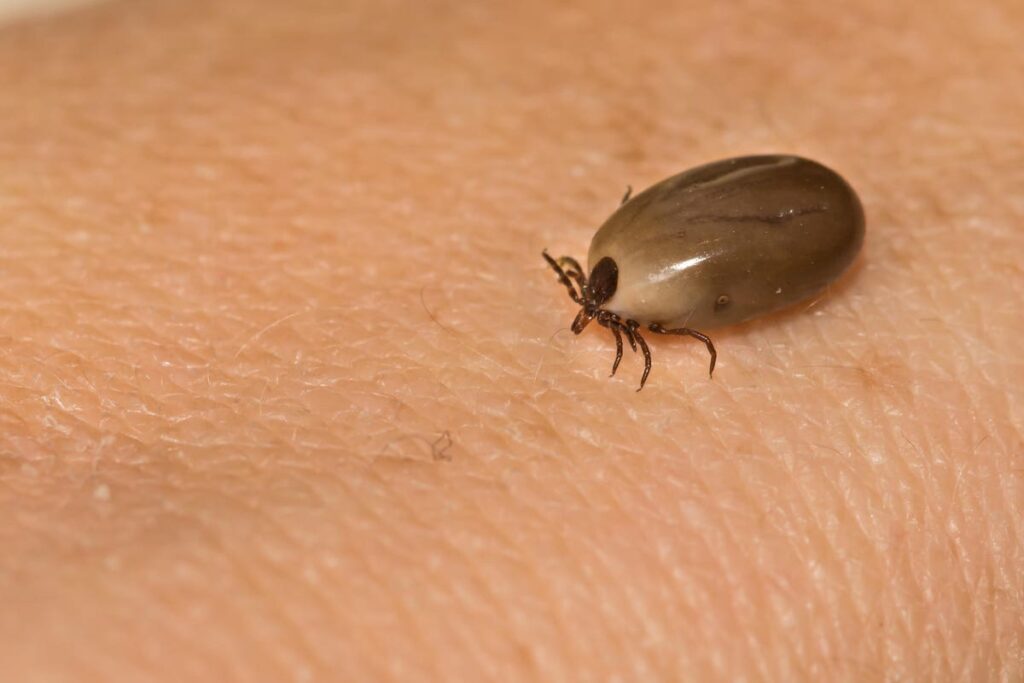Deer Ticks, such as the one pictured here, can carry the Powassan Virus and infect you with a bite. … [+]
The Powassan virus is a “ticking” time bomb, so to speak. While Powassan (POW) virus disease in humans still seems to be rare, one’s gotta wonder whether this tick-borne virus will become more and more common with climate change. And whether POW will ever get to the point where POW it’s yet another bigger public health problem. On May 17, the Maine Center for Disease Control and Prevention (Maine CDC) confirmed the death of adult from Sagadahoc County, Maine, after becoming infected with the Powassan virus and developing neurologic symptoms. This was the first identified case of POW virus disease in Maine in 2023. Maine has had only 15 confirmed cases since 2015, but there were four in 2022 with two of them eventually dying. Since 2015, Maine has had a total of three recorded Powassan deaths.
While the U.S. has averaged only about 25 reported cases of POW each year since 2015, it’s not clear how many cases go unreported. Many people who get infected may not even end up having symptoms. Those who may have symptoms easily mistaken for other conditions such as a fever, headaches, vomiting, weakness, or a general unwell feeling. As I’ve detailed for Forbes previously, the bigger concern are the more serious neurological problems that may occur when your brain or spinal cord get inflamed. This may result in memory loss, confusion, or seizures. Around 10 percent of those suffering such severe disease will end up dying. If you experience any of these symptoms after a tick bite, call a health care provider as soon as possible.
Catching the Powassan virus can be an “Oh, deer” moment or rather an “Oh, deer tick” moment. A deer tick or woodchuck tick carrying the virus can transmit the POW to you by biting you and sucking your blood, which would really bite and suck at the same time. Such ticks have unfortunately become increasingly common in many parts of the U.S. including Maine. Ticks don’t like the cold. They are most active in the spring, summer, and fall. Climate change is leading to warmer average temperatures and potentially shorter and milder winters, earlier springs, and hotter summers. And as the Centers for Disease Control and Prevention (CDC) has indicated, milder winters can mean that fewer disease-carrying ticks die during winter, meaning a larger and larger tick population over time.
Until something more is done about this Tick Tock situation, make sure that you take proper precautions while in any wooded, leafy, and shrubby areas where deer ticks like to live. Closely monitor what’s happening with the tick population in your area. Wear light-colored clothing. Don’t wear a black turtleneck like Elizabeth Holmes because you then have to talk in a very low voice and may not be able to see any ticks hanging on your clothing. Try to keep your arms and legs completely covered with your pants tucked into your socks. This will make it more difficult for ticks to access your skin. It can also help to apply a repellant that’s been approved by the Environmental Protection Agency (EPA) such as DEET, picaridin, IR3535, or oil of lemon eucalyptus on your skin or permethrin on clothing.
Check your body and possessions for ticks each day and every time your return from outdoor activities. The emphasis here is on checking for ticks and not checking TikTok. Checking TikTok may find you some videos but not ticks on your body or clothing. Once you reach home, remove your clothing. Warn people around you before you do this. Claiming “I was just putting my clothes in the dryer because of potential ticks” may not work after you’ve done so and gotten slapped or asked to leave. Also, make sure that you have something to wear before taking off your clothes when around people unless you are in a nudist colony. Putting your clothes in the drier before the washing machine may sound counter-intuitive but the high heat in the dryer for 10-15 minutes can kill any ticks that still may be hanging on your clothing.
Check your family members, pets, friends, dates, and other companions for ticks as well, not necessarily in that order. Also, warn them before checking for ticks. Telling them “I was just checking you for ticks” may not excuse you after the fact. Here’s something else you can do if you have companions: ask a veterinarian about tick bite prevention. Of course, this will work with only certain kinds of companions such as cats and dogs. If you were to ask a veterinarian about your date, you may not have another date with that person.
Again, while such deaths from POW virus disease may be rare now, you never know what may happen in the future, especially with all this climate change stuff. Right now, the U.S. isn’t doing enough about controlling the tick population. Many local public health departments are strapped for cash and therefore are limited in what they can do. What’s really needed is a more organized approach to this growing tick-ing time bomb problem. Otherwise, POW, we may end up in a situation that’s already become too hot to handle.


